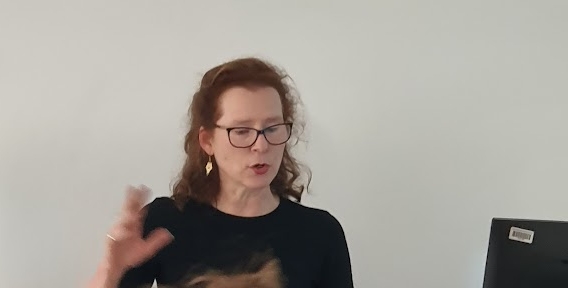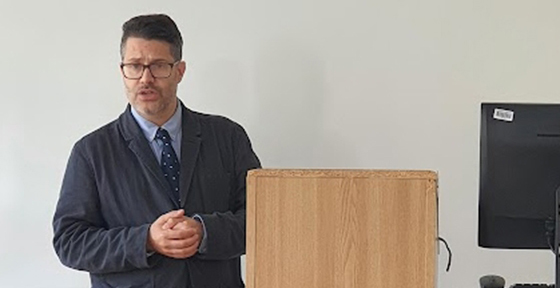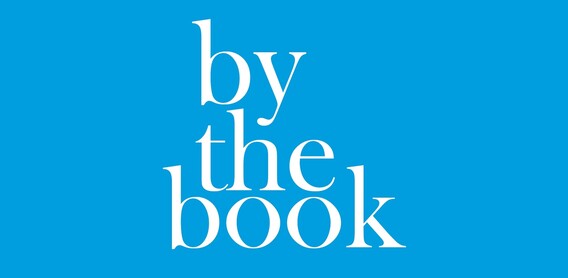On the 26th and 27th of June 2024, the University of Ljubljana (SLO) hosted By The Book 9. This year the annual conference of EUROPUB, the European Association of Publishing Studies, was titled: Crafting Value in Today’s Book World. Navigating the 21st century’s challenges and opportunities in trade, academic, and educational publishing. Declared goal of the conference was it to “delve[-] into the formation of value in the consumer and scholarly book industry, whilst predicting future transformations. A focal point of our discussions this year will be the pressing challenges faced by everyone in crafting sustainable value, whether technological, economic, or social. The profound significance such value has on the landscape of the industry prompts us to assess the habits and strategies among industry stakeholders — from authors, publishers and editors to booksellers and readers.” (From the call for papers / the invitation.)
In the following, we will convey a few impressions from the AI & Publishing panel and conference and salient impressions from a selection of the other panels.
AI & Publishing
The conference opened with a block of presentations on AI in publishing.
George Walkley (see picture), an independent consultant and the former Head of Digital at Hachette UK, started with his observations:
- For many, AI is an unsettling, fast changing landscape and they don’t feel comfortable with it (yet). While technological change often triggers such reaction, the degree seems to be different this time, compared to e.g. the emergence of ebooks.
- Copyright issues are one of the main concerns when it comes to Large Language Models, even if (or especially as) they are not necessarily illegal. An outright boycott of companies or services with connections to data usage that seems wrong is almost impossible. This is exemplified by the fact that many publishers today are using AI already, e.g., to automate tasks, analyze and process data or optimize the workflow. In contrast, the creation of content with AI is largely being adapted by selfpublishers. Kindle recently introduced an upload limit (with respect to number of books to be uploaded *per day*) as a reaction to having their platform be flooded by AI ebooks.
- With existing and yet to come AI regulations around the world, the availability of services and technologies may vary depending on one’s location.
- AI translations in combination with Print on Demand are an attractive and low risk way for publishers to make their books internationally accessible. That being said, training data for LLMs is mostly from the global west, which is why some languages are represented better than others.
- There are book genres that fit better with AI due to their need of interactiveness and/or updatability, e.g., instructional, educational and legal books
Walkley closed his keynote by explaining that, moving forward, AI systems will be increasingly trained on AI generated web-content, making them possibly worse than they are now. With an increasingly cluttered online space, bookshops might gain more importance as places of trust due to dedicated curation.
After that, the focus shifted specifically onto AI within educational publishing. Jocelyn Hargrave (University of Derby / UK) presented the main concerns with generative AI of editors’ chiefs: accuracy & misinformation, copyright infringement, cultural bias and environmental inputs. This was confirmed by Gianluca Pavani (University of Rome Tor Vergata / I), who is working on a gen AI ghostwriter project: in collaboration with professors and the help of GPT4, they have been extending and transforming unstructured text from PowerPoint slides into a full-length book on Biotechnology. In 8 weeks, they generated drafts for 7/10 chapters with five already being approved by scientific editors. They are very content with the results and plan to produce more books using this technique. Christoph Bläsi(Johannes Gutenberg University Mainz / D) closed the segment with an account of a similar LLM project that was carried through last year by Springer Nature and publishing students from Mainz and Edinburgh. Th students set out to write a small book – that will actually be available from the end of the year! – about the challenges and opportunities that arise, when publishing studies alumni hit the publishing industry in transformation. In this case, a pipeline called AI book designer (developed by Springer Nature) was used that featured the following steps: design the book, outline the TOC, shape the chapters, check the references, first draft, revise the manuscript, finalize the manuscript. Bläsi concluded that the experiment was very time intensive and that the initial generated text quality was not (yet) really convincing in places as it included almost-repetitions, inconsistencies in style, etc. – an indispensable thorough final editing by the authors, the students, and Springer Nature editors solved these problems, though. And that’s, how things very likely will – and should – be carried through in the time to come.
Literary Hub / Literary Media Studies
In her keynote, Simone Murray (Monash University, Melbourne / AUS, see picture) showed her academic expertise by examining Literary Hub (https://lithub.com), a website that has established itself as the number one address for curating English literature, literary newsletters, literary journalism and aggregating reviews – all while going through significant changes over the years. To grasp such a multifaced platform in its complexity, Murray used a method she coined Literary Media Studies, blending cultural sociology, literary studies and publishing studies.

Sophie Noël (Université Paris Panthéon Assas / F) reported on the findings she made in a Creative Europe financed research project on book retail and (biblio-)diversity in Europe, where she focuses on francophone bookshops abroad, i.e. outside France. The approx. 200 bookstores, whereof 30 are located in Europe, have longstanding links with the Ministry of Foreign Affairs and outlets of the Institut Français abroad, and are constantly serving public, commercial and political interest at the same time. Their customer clientele which consists mostly of French who moved abroad and foreign francophones has an online alternative since 2021, when Lireka launched. Bricks-and-mortar bookshops see themselves faced with this ecommerce competition operating under “unfair conditions”, including quicker delivery, higher discounts, and lower transport and rent cost. Therefore, a call for more state subsidies for these bookshops is growing.
Hanne Willekens (Ghent University / B) looked into the topic of gender and genre in book reviews in Sweden, a country in which the book industry has been reported to be in a state of “feminization”. Literary critics have the ability to give authors cultural legitimacy and regardless of their verdict declare a book relevant by giving it attention. Therefore, it’s worrisome that female authors are underrepresented in reviews of the genres thriller, detectives, horror, sci-fi, romance and feel good, although they are overrepresented when it comes to novels.
John Rodzvilla (Emerson College, Boston / USA) presented a diverged analysis of book advances with regards to authors’ race and gender. The research was initiated by the hashtag #PublishingPaidMe which began to trend on Twitter in 2020 (65.000 tweets) as a call for transparency about one of the most secretive areas of trade publishing: pay. The 600 useful tweets and 3000 entries from an additional Google spreadsheet that Rodzvilla evaluated showed that black authors have the 2nd highest median with regards to advances paid compared to their white, Asian, Hispanic and indigenous colleagues. However, when looking at the five big publishing houses and the genre of literary fiction (where black authors predominantly publish in) they just receive half of the pay of their white counterparts!
The first conference day was completed by a roundtable discussion with the title “Breaking the furniture. Creating innovation in established publishing practices” between Anna Kiernan (University of Exeter / UK), Tom Abba (UWE Bristol / UK) and aforementioned George Walkley on creating innovation in established publishing practices. Walkley metaphorically compared the publishing industry to an old chair at a friend’s house, asking which parts are worth keeping, which can be renewed, and which have to go. Kiernan focused on finding the right balance between a more humanities-based approach (rather: “mend”) and a more business studies-oriented one (“break”), when it comes to operating and innovating in publishing, giving the example of the viral app “Zombies, Run!” which combines audiobooks and running into an immersive experience. Tom Abba in return introduced the audience to the innovative projects and stories he’s been working on, e.g. the Ambient Literature programme, From Bitter Ground, and These Pages Fall Like Ash. New ideas and formats, the panel agreed on, predominantly emerge outside of the industry, which is why publishing houses should abolish their sole focus on books and operate with a broader understanding of publishing moving forward.

“Oh no, an AI & arts talk by a local”
– a promising title to start off the second day of By the Book 9: Slovenian digital artist and net.art pioneer Vuk Ćosićused it to give an introduction to his work which has been involving books and the book world at not a few occasions. Following a reoccurring idea, he had set up “Read More”-WIFI routers at art installations or public places that give access to shadow libraries (i.e. at the expense of priced-in copyright infringements …) of works on closely linked topics.
The first research speakers of the second day put their emphasis on the experience of reading. Gertrude Gibbons(University of York / UK) gave a literary deep dive into the dark and twisted intertwining of the book and its writer as well as reader, exemplified primarily by Mary Shelley’s Frankenstein. The observable fear of the creative act, Gibbons suggested, perhaps stemmed from growing “mass” audiences through the 18th century, with increased literacy, and the rise of professional criticism. Mary Shelley distanced herself from the task of story-writing by having the reader become a voyeur of the letters by a fictitious author. Interestingly, throughout Frankenstein the act of writing/printing is associated with some kind of death.
Kamila Augustyn (University of Wrocław / PL) presented preliminary insights from an exploratory pilot study trying to understand changes in reading engagement under different circumstances. For this, she had conducted thirty in-depth interviews using grounded theory, understanding the results as mirrors to the way people construct narratives about themselves and their environment. She noted that to study reading experience means to look at an ongoing process, with many variables like knowledge, self-concept, expectations, setting and culture being greatly influential. For even purer insights, Augustyn suggest a book reporter app that gives the participants the opportunity to keep a digital diary in a (more) natural setting and monitor daily changes, reading habits and practices – and looks for potential cooperation partners.
In the context of the European Accessibility Act, another panel concentrated on accessibility in the publishing industry. Fleur Praal (Leiden University / NL) talked about audiobooks and subscription services in the Dutch trade book market. While reading motivation in the Netherlands is at an all-time low, the estimated growth per year for the audiobook market is at 22% percent. In 2023 KoboPlus and Storytel, two of the main players in the Dutch audiobook sphere, saw Fluister emerge, a platform for ebooks, audiobooks and podcasts, owned by a conglomerate of big Dutch publishing houses, a bookshop chain and media ventures. In comparison to print, where due to a collaborative effort by the different industry associations sales data is published, audiobook streaming numbers don’t get disclosed, making it hard to get a grip on the booming format.
Agata Mrva-Montoya (University of Sydney / AUS) – although clearly not in the scope of the EU Accessibility Act …) investigated the business of “born-accessible” publishing, especially in the educational publishing sector. Through interviews she found out that nowadays it has become the norm for larger and medium-sized organizations to think of accessibility, while it’s less frequent with smaller, resource limited publishers. The greater workload and financial costs required for born-digital products reportedly also lead to better products for all users, while it’s too early to evaluate the impact of such a policy on sales.
Milena Risi (University of Rome Tor Vergata / I) presented insights from her research on AI-generated alt texts. Alt text, alternative descriptions of images and visual content, eliminates barriers and makes sure that even those with visual impairments can fully engage with the material. Due to the EU Accessibility Act, all digital publications need alt text from June 2025 onwards, which is why AI-automated solutions are sought after. Risi generated alt text with the models GPT-4V and GPT-4o using a multimodal prompt structure including the image, context (surrounding text of the image), and instructions (based on a criteria catalogue). She concluded that the technology can assist in making content inclusive and accessible, as proven by flawless results, but, not least due to training-related bias, is prone to mistakes – human interaction remains essential.
In the final panel of By the Book 9, Robbe Vandersmissen (Ghent University / B) showed one way of analyzing a national, contemporary literary publishing field, using the example of Sweden. In a pilot study, Vandersmissen rated numerous Swedish publishing houses on the basis of 11 Bourdieu-inspired variables covering the legal and financial status, the weight in the market/commercial success as well as with respect to the field/symbolic capital. This resulted in the creation of clusters, ranging from the “largest, oldest and most prestigious publishers and their imprints” who are “Stockholm-based limited companies with significant amounts of economic and cultural capital” to a “homogenous group of small-sized publishing houses” that focuses on high-quality literature and gets a disproportionately large number of support grants.
In the final presentation of By the Book 9, the European conference of Publishing Studies, Kamila Augustyn asked a very important, more inward-looking question: “Where Are We Now?”. With this question, she proposes a collective effort to her attending academic colleagues in the direction of a charting of the Publishing Studies field. For this, she suggests to a critical Delphi study concerning what the field of Publishing Studies actually encompasses. For this purpose, she outlined the different first level dimensions that would need to be thoroughly explored: foundations, object, processes, methods, institutions, people.
This year´s edition of By the Book 9 again confirmed the wide range of highly relevant topics researched and discussed in European (and beyond) Publishing studies. Nest year´s conference will most probably take place in Korfu (GR).
 By
By 


















